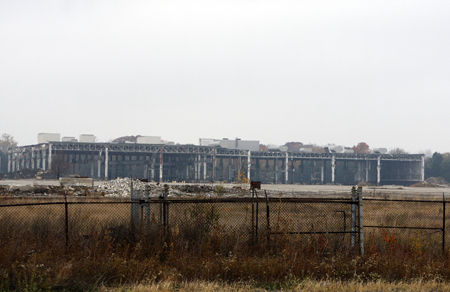
An abandoned General Motors plant in Lansing, Mich. Image: Brian Lankowski
By LANE BLACKMER
LANSING – Water quality advocates are fighting legislation that would let voter-approved bond money be used for brownfield cleanup rather than water infrastructure improvement.
The money is on hand because Michigan voters in 2002 overwhelmingly approved a proposal that made $1 billion in loans available to the state to improve water quality.
Now, Sen. Patty Birkholz, R-Saugatuck, is pushing a bill that would allocate about a third of the money left to clean up land polluted from industrial uses, otherwise known as brownfields.
The Senate and House passed different versions of the bill but have not reached a consensus.
Birkholz said she expects the bill to pass this year.
Michigan Director of Clean Water Action Cyndi Roper said about $600 million of the money is left, and the legislation aims to allocate $250 million of the balance for brownfield projects.
Roper said her group doesn’t want the money spent on brownfields because it’s not what voters approved.
It also won’t solve the state’s most serious water pollution problems, she said.
“We want funding for brownfield cleanups, but we don’t think it’s appropriate to be robbing Peter to pay Paul,” said Roper.
Mary Dettloff, press secretary for the Department of Natural Resources and Environment, said Roper’s view of the funding is too narrow, and using the money for brownfield cleanup would reduce non-point pollution.
The goal of brownfield cleanup is to get rid of contaminated soil and water so the land can be reused. Birkholz said businesses could then build in cities rather in rural areas, and that brownfield projects could also reduce groundwater pollution.
However, Roper said water and sewer systems need the money more. She said state estimates for water infrastructure repair is about $2 billion.
“We could use double the amount voters approved,” she said.
Detroit and 126 suburbs share a public water system that is in particular need, Roper said.
“It’s also the oldest infrastructure in the state,” Roper said. “And they are managing a lot of the wastewater for Southeast Michigan.”
Detroit’s water and sewage system serves eight counties, including Wayne, Oakland, Macomb and Lapeer.
Bill Misterovich, chief deputy of the Macomb County Public Works Commissioner, said Macomb has been using the loans for the past five or six years, and currently has three projects pending approval.
“We have a real need for money to address environmental and water quality issues here in Macomb County, as do other counties in the region,” he said. “The voters approved it for a particular purpose and we’re not happy about the proposal.”
Roper said cities suffer more than rural areas because runoff from pavement causes water to build up and overflow the system.
Roper also said some lawmakers are arguing that the money isn’t being used, so it would make sense to redirect money to brownfields. But she said it isn’t being used as much because communities don’t have the money needed to repay the loans.
“The state put it into loan format instead of a more accessible program,” she said. “Local communities aren’t accessing it.”
But Birkholz said the fund should continue as a loan system because otherwise the money would serve only particular communities.
“People ought to pay for their own solutions to problems,” she said. “It should not be government giving everything to people.”